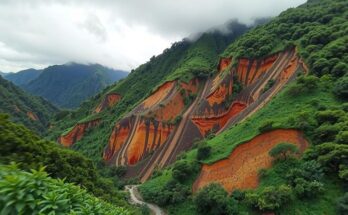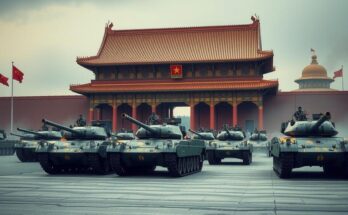The Democratic Republic of Congo is currently embroiled in heightened conflict due to the M23 rebels capturing significant territories. This situation is influenced by external factors from Rwanda, Burundi, and Uganda, each trying to assert their interests amid a humanitarian crisis. Key players, including President Tshisekedi of the DRC and President Kagame of Rwanda, have their agendas, fostering regional tensions and complicating diplomatic efforts to restore peace.
The recent surge in conflict in the Democratic Republic of Congo (DRC) has been exacerbated by the M23 rebels seizing substantial territory in the eastern region, a move deeply entwined with regional dynamics involving Rwanda, Burundi, and Uganda. These nations are not only military players but are also instrumental in the humanitarian crisis unfolding as they vie for influence and resources. Amidst an emergency summit organized by the East and Southern African blocs, divergent objectives from these nations are central to understanding the crisis.
President Félix Tshisekedi of the DRC is focused on reclaiming lost territories, particularly Goma, which has fallen to the rebels. He accuses Rwandan President Paul Kagame of supporting the M23 through military means to further destabilize his government and exploit the DRC’s mineral wealth. Despite international acknowledgment of Rwandan involvement, tangible support for Tshisekedi’s administration has not materialized, complicating his efforts and increasing his political vulnerability.
Rwanda’s position in the conflict appears defensive; Kagame claims involvement is warranted to combat armed groups that threaten Rwanda’s security and to protect Congolese Tutsis. Although denying allegations of direct military support for the M23, Rwanda seeks recognition of what it frames as a Congolese issue while aiming to retain influence over eastern DRC’s resources, amidst broader geopolitical strains with Congolese leadership.
Burundi adds another dimension; it has stationed troops in eastern DRC ostensibly to combat its rebels but increasingly in support of the DRC government against the M23. President Evariste Ndayishimiye has expressed strong reservations about Rwanda’s objectives, fearing that continued Rwandan advances could threaten stability in Burundi. This tension illustrates the precarious balance of power in the region as nations react to perceived threats against their leadership.
Uganda’s involvement in the conflict oscillates between supporting the DRC and alleged complicity with the M23. While Uganda claims its troops are deployed against the Islamic State-linked militants, reports suggest it has permitted the M23 to utilize its territory for logistical support, leading to further complexity in the regional power dynamics. Analysts contend Uganda aims to safeguard its economic interests while maintaining its influence amidst escalating tensions.
South Africa’s role as a peacekeeping force in the DRC has also prompted conflict with Rwanda, particularly after the deaths of South African soldiers led to a public dispute over accountability. South Africa’s commitment to the DRC’s sovereignty contrasts with Rwanda’s push for direct negotiations with the M23, highlighting an ongoing rift within African regional organizations. These varying positions among neighboring nations underscore the intricacies of the DRC crisis, where issues of sovereignty, territorial integrity, and geopolitical interests are deeply intertwined.
The Democratic Republic of Congo has been plagued by conflict largely driven by its vast wealth in natural resources and historical violence linked to regional tensions. The M23 rebellion is symptomatic of these larger issues, involving not only local factions but also neighboring countries with vested interests in the region’s stability and resource management. Kibali Gold Mine and other lucrative assets have made eastern DRC a hotspot for national and international players, leading to complex power struggles and humanitarian crises. The cascading effects of these tensions have led to emergencies necessitating high-level diplomatic discussions.
The crisis in the DRC reveals a multifaceted conflict involving regional powers where military, political, and economic interests converge. Neighboring countries such as Rwanda, Burundi, and Uganda play critical roles, each with distinct objectives that complicate the situation further. As tensions rise and humanitarian needs grow, the impact of these international actors, along with internal dynamics, will be pivotal in shaping the future trajectory of the DRC and its stability.
Original Source: www.bbc.com




